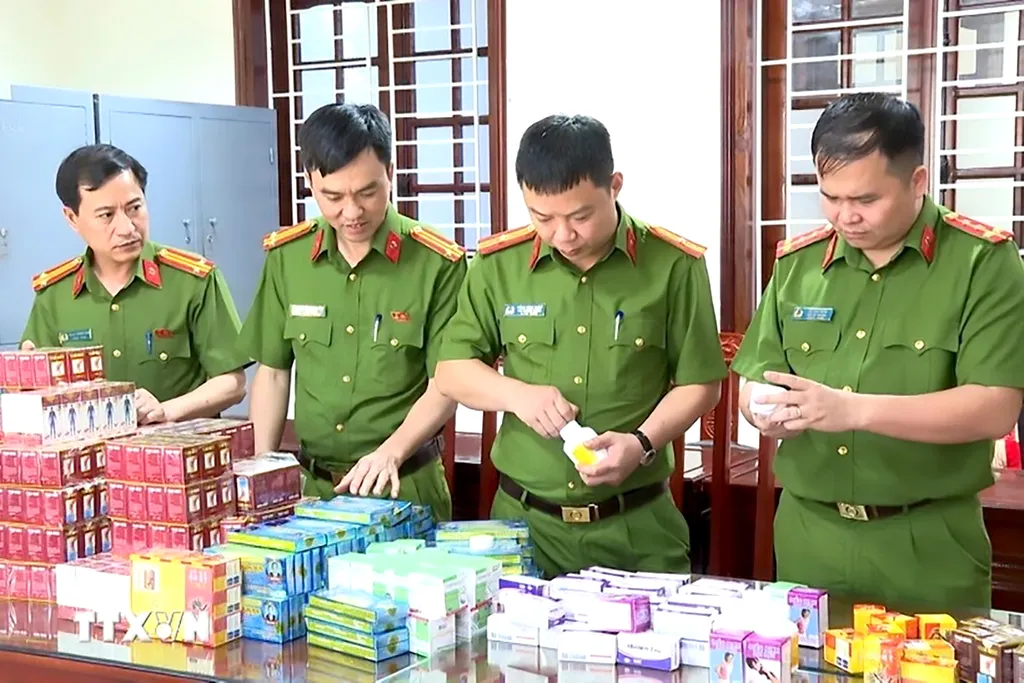 Society
Society

 |
| Thanh Hóa Police have dismantled a large-scale network involved in the production and trade of counterfeit pharmaceuticals. VNA/VNS Photo |
HCM CITY - Although Việt Nam has established a relatively comprehensive pharmaceutical management system, from pre-market to post-market surveillance, efforts to prevent and combat counterfeit drugs still face many challenges, with criminals exploiting loopholes.
The consequences of counterfeit drugs are severe, not only threatening patients' health but also eroding public trust in the healthcare system and weakening the pharmaceutical industry. Therefore, strict and deterrent penalties are necessary.
Speaking at the workshop 'Counterfeit Drugs - Real Consequences: How to Prevent Them?' held on Monday in HCM City, Deputy Minister of Health Đỗ Xuân Tuyên emphasised the importance of medicine as a special commodity directly affecting human life and health.
However, in reality counterfeit and sub-standard drugs, particularly traditional medicines and those of unknown origin are being sold rampantly on social media and in recent times the issue has become increasingly complex, according to Tuyên.
Exploiting the trust of patients and the public's gullibility, many individuals have used social media, celebrities, and even the names of doctors to advertise counterfeit drugs as 'miracle cures'.
"Any act of producing, trading, or distributing counterfeit drugs, even if it involves just a single pill, is a serious violation of the law and social ethics, and must be condemned and strictly punished," the Deputy Minister of Health said.
"The Ministry of Health's stance on this issue is very clear and consistent: there must be a resolute fight and strict handling, with no 'forbidden zones' and no exceptions.
“Simultaneously, acts of covering up, aiding and abetting, and managerial irresponsibility that allow counterfeit drugs to exist and infiltrate the drug distribution system must also be addressed."
According to statistics, in 2023, Việt Nam detected over 160 cases related to the production and trafficking of counterfeit drugs, leading to administrative sanctions and criminal prosecution for many individuals.
In 2024, 27 types of drugs were suspended due to not meeting quality standards, of which eight types were identified as counterfeit.
Notably, counterfeit drugs today are not just pills with copied packaging but have become increasingly sophisticated, using modern printing technology, fake QR codes and forged labels, making them difficult to distinguish from the real medicines, even for industry insiders. Meanwhile, the current post-market surveillance system remains fragmented, and inspection capacity at many facilities is still lacking.
Additionally, legal loopholes are also a reason why controlling counterfeit drugs remains difficult. Enforcement against counterfeits still faces difficulties.
Currently, although penalties for the production and trafficking of counterfeit drugs are stipulated in Article 194 of the Penal Code, in practice, the handling of these acts is still not a sufficient deterrent. Counterfeit drug production and trafficking rings operate in an organised, large-scale and sophisticated manner, making them very difficult to identify and detect.
Sophisticated tricks, severe consequences
Deputy Head of HCM City's Market Management Sub-Department Nguyễn Quang Huy said that in 2024 alone and the first five months of 2025, his officials detected and processed numerous cases related to pharmaceuticals, cosmetics, functional foods, medicinal herbs and traditional medicine ingredients.
Common violations detected included trading smuggled goods, goods of unknown origin and source, incorrect price listing and trading counterfeit branded goods, according to the sub-department.
Through compiling and reviewing inspected cases and recently detected incidents, the Sub-Department has observed that common methods and tricks used by offenders involve using imported labels to legitimise drugs and functional foods of unknown origin, source and quality information.
Notably, a new and particularly dangerous tactic is the mixing of genuine drugs with counterfeit ones before they are sold on the market.
This method aims to deceive authorities during random inspections and build initial trust with consumers.
The perpetrators even invent drug names and manufacturing company names, mostly with virtual headquarters abroad, such as in Malaysia or Singapore, then, they advertise them as 'hand-carried goods' through social media, under the guise of being employees or pharmacists of pharmaceutical companies. Mixing genuine products with fakes is a particularly dangerous act and makes detection more difficult during on-site inspections.
Doctor and pharmacist Nguyễn Quốc Bình, who is the Deputy Director of Chợ Rẫy Hospital, believes that counterfeit and substandard drugs certainly lack sufficient dosage, meaning users do not achieve therapeutic concentrations.
Based on research, he noted that the three greatest dangers of using counterfeit and substandard drugs are: Wasting the 'golden time' (critical window) for treating the illness, the risk of introducing foreign or harmful substances into the body and increasing drug interactions, causing the body's detoxification organs (liver, kidneys, etc.) to work harder, and increasing treatment costs.
According to Dr Tạ Mạnh Hùng, Deputy Director of the Drug Administration of Vietnam, under the Ministry of Health, those who produce and sell counterfeit drugs are becoming increasingly sophisticated.
They can produce illicitly without needing fixed factories, break down the production process into smaller parts to avoid detection, and use social media as a sales channel. Meanwhile, some retail pharmacies do not strictly comply with regulations, selling drugs without invoices and with untraceable origins, creating conditions for counterfeit drugs to penetrate the legitimate system.
Hùng proposed increasing penalties and adding regulations to control online drug sales, publicly disclosing information about distributors and implementing origin traceability using QR codes.
“Furthermore, inspections and audits of pharmaceutical businesses need to be tightened, with strict handling of violations, especially those involving sales on social media,” said Hùng.
“The fight against counterfeit drugs is a difficult and long-term task, requiring the involvement of the entire political system, along with the vigilance and cooperation of the public." VNS




